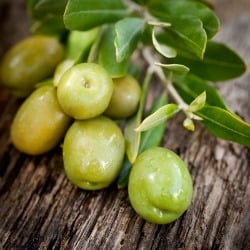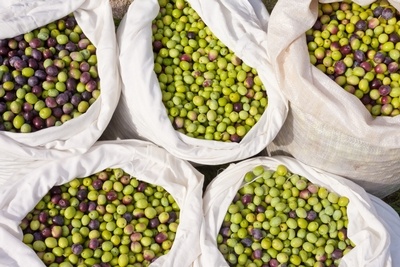 What’s the difference between organic olive oil and regular, plain old olive oil? A lot more than you may think!
What’s the difference between organic olive oil and regular, plain old olive oil? A lot more than you may think!
The key here is knowing your descriptive terms on the label (or within the oil name), and understanding which terms actually denote different quality grades. When reviewing the differences between organic oil and regular oil, it’s important to know that you’re not just comparing if the oil was grown organically or not — most often, you’re also comparing two different olive oil grades that have been produced in completely different ways.
How Organic Olive Oil Is Made
Almost all organic olive oil on the market is organic extra virgin olive oil. Because this oil is so prevalent, when we talk about organic olive oil, this is almost always going to be an extra virgin grade. This oil is the first cold press of the olives, and is by far the highest grade of olive oil.
This Extra Virgin Olive Oil (EVOO) is made through simple and natural methods, to keep the oil the highest quality possible. To make this oil, the olives are first washed and then crushed, which turns them into an olive “paste”. This paste is put in a centrifuge and spun, which extracts the excess water from one side and the oil from another. This oil is the final product — it’s really just a fresh squeezed fruit juice (because olives are technically a fruit).
Of course, this Extra Virgin Olive Oil is made from organically grown and certified olives. There is also conventionally grown EVOO, not made from organic olives, and this would be the most comparable “apples to apples” comparisons.

The Organic Olive Growing Process
Organic olives are those that have been documented by an accredited organic certifying agency to be grown without the use of chemical fertilizers, pesticides, or other artificial agents. This means that to be organic, the olives can’t use any chemicals or pesticides to help them grow.
The bigger picture is that olive trees in general are a very hearty tree. They require little to no pesticide intervention to grow olives normally (unlike, for example, apple crops here in the US). Most growers, especially those outside of the US, don’t use any chemicals on any of their trees. However, the organic certifying process documents and guarantees this fact for consumers.
How “Olive Oil” Is Made
Now here's where it gets confusing: if you are comparing plain old olive oil to organic, you should know that “Olive Oil” is it’s own unique grade and is not the same quality as the Extra Virgin Olive Oil that we talked about above — organic or not.
Here’s how you make the grade “olive oil”:
1) Start with Virgin Olive Oil and refine it using a high heat process to make a new grade: Refined Olive Oil.
2) Mix a little bit of Extra Virgin back in.
Voila! Your new blended creation is known as the the grade "Olive Oil”, as defined by the International Olive Council — the IOC — and the USDA. It's important to understand that this simplest term – “olive oil” – is used to describe a mostly-refined oil, which is a more complex item then the original squeezed oil that came out of the olive. Now let's mix it up a little bit more. The adjective "pure" has been used to describe the particular grade known as “Olive Oil” for a long time. So much so, that through the US marketing and labeling of this type of oil, the grade is often just referred to as "Pure Olive Oil" or simply “Pure”.
Let’s Review
Organic Extra Virgin Olive Oil = Fresh squeezed olive oil, made from organically grown and certified olives
Olive Oil or Pure Olive Oil = Refined virgin olive oil blended with Extra Virgin, made from olives that may or may not have been grown organically, but are not certified.
Other Differences Between Organic (Extra Virgin) Olive Oil and Olive Oil
In addition, you’ll find that Organic Extra Virgin Olive Oil has much more natural variation than you’ll see on regular “olive oil” or Pure Olive Oil. This is because it is completely unrefined, which allows it to show the olives original color, flavor and more.
Wide Variety Of Colors
Organic Extra Virgin Olive Oil comes in a wide variety of colors, from light yellow to dark green. In opposition to what many people believe, the color of olive oil doesn’t indicate its quality. It all depends on when it is harvested, how ripe the olives are, and the type of olives that are used.
Olive oil (or Pure Olive Oil) will be light in color. It will also not see that much variation, because it’s a refined oil which provides some consistency from lot to lot.
Wide Variety Of Flavors
Organic Extra Virgin Olive Oil also comes in a wide-variety of lush flavors. You will find some oils that are mild, buttery or sweet, and others that are more pungent, strong and/or peppery. The flavors each depend on the varietals of olives that are used to make that particular oil, as well as other crop related discussions like the amount of rainfall, and other qualities that can be imparted by the soil.
Olive oil (or Pure Olive Oil) will be light in flavor. For the same reason as it is light in color (above) the refining process provides some consistency in a light flavor as well.
Organic EVOO Is Unrefined
Organic Extra Virgin Olive Oil is an unrefined olive oil, which means that it’s literally just fresh squeezed olive juice. It is an oil that’s cold pressed (or cold spun, really) and produced without heat from the first crushing of the olives.
Olive Oil (or pure olive oil) by definition is going to be a refined oil blended with an unrefined oil. Most of that blend though — usually somewhere from 50-99% — is going to be made up of refined olive oil.
In Conclusion
Is organic olive oil really that different than regular olive oil? The most common organic olive oil type is organic extra virgin olive oil.
When comparing this organic extra virgin olive oil oil to regular extra virgin olive oil, no it's really not that different. The oil is very similar, but it just depends on how passionate you are about wanting to eat organically. As I mentioned though, regular EVOO doesn't require much (if any) pesticides. Of course, this is not a guarantee across all farms and brands, but for the most part, even with regular olive oil you're not going to be consuming a lot of chemicals or other pesticides people are normally trying to avoid when eating organic.
Is organic extra vrigin that different than some of the other regular olive oil grades like pure olive oil? Yes, this oil starts to be a lot more different in color, flavor, functionality and heat tolerance.













